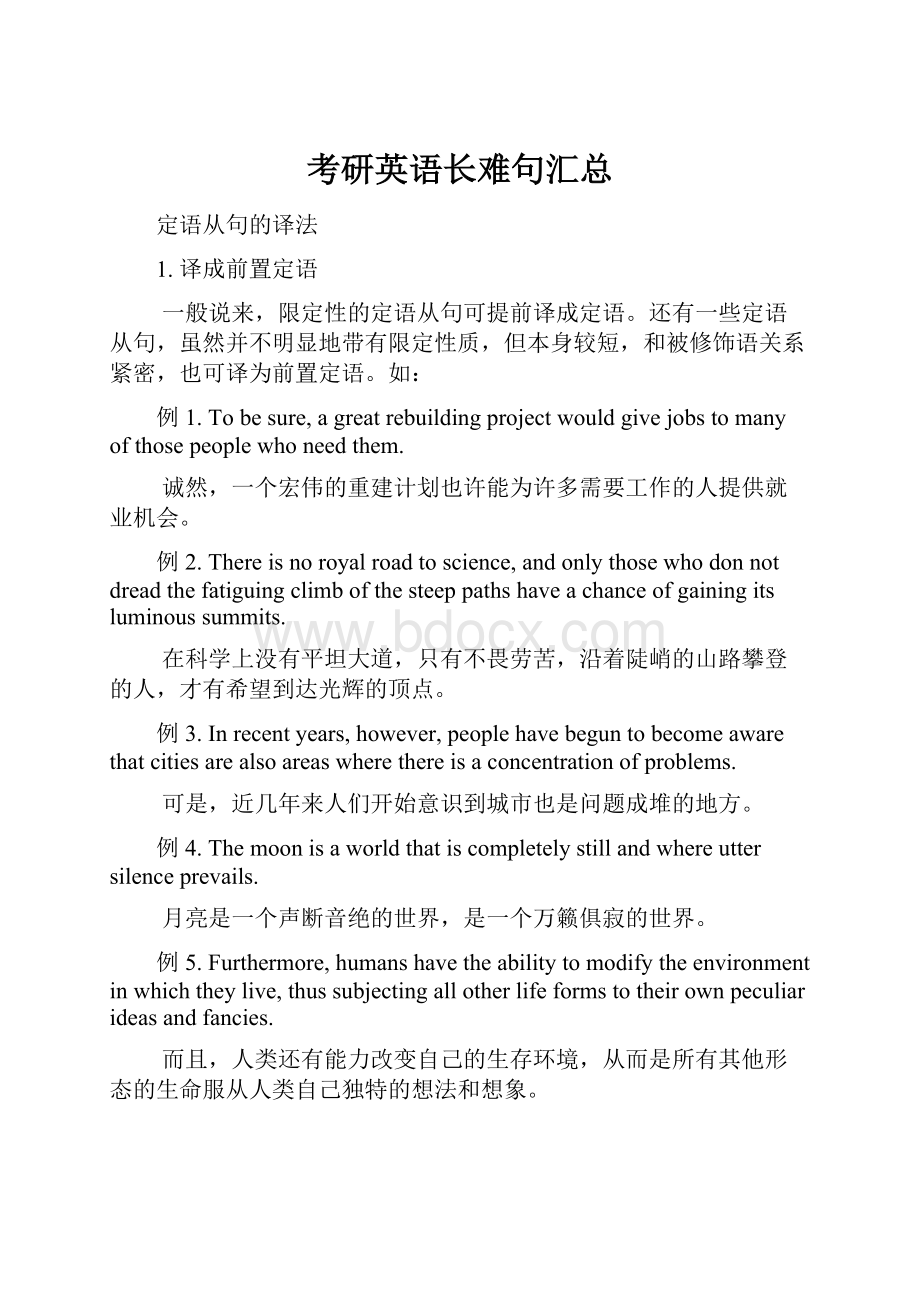考研英语长难句汇总Word文档格式.docx
《考研英语长难句汇总Word文档格式.docx》由会员分享,可在线阅读,更多相关《考研英语长难句汇总Word文档格式.docx(34页珍藏版)》请在冰豆网上搜索。

但更为重要的是,这是科学家们所能观察到的最遥远的过去的景象,因为他们看到的是150亿年前宇宙云的形状和结构。
如以上例句所示,这种译法最适于翻译较短的限定性定语从句。
有时较长的限定性定语从句也可采用这种译法,以使修饰关系清晰,句子结构紧凑。
例7.ThispracticebookisintendedforforeignengineersorstudentstoengineeringwhohavealreadymasteredtheelementsofEnglish,andwhonowwanttousetheirknowledgeofthelanguagetoreadbooksontheirsubjects.
这本练习是给那些已经掌握了英语基础知识而现在要利用学到的语言知识来阅读专业书籍的外国工程师或学习工程学的学生用的。
例8.TowriteagenuinefamiliarortrulyEnglishstyleistowriteasanyonewhowouldspeakincommonconversation,whohadathoroughcommandandchoiceofwords,orwhocoulddiscoursewithease,forceandperspicuity.
用真正的普通文体即纯正的英语文体写作就像那些谙熟词汇而又善于选择词汇,能高谈阔论且言词流畅,说话有力而明确的人的日常交谈一般。
例8中的whohadathoroughcommandandchoiceofwords,orwhocoulddiscoursewithease,forceandperspicuity本应紧接先行词anyone,但由于太长而后移,而whowouldspeakincommonconversation则修饰上述两个定语从句及其先行词。
有些起附加说明作用的非限定性定语从句,对先行词也有程度不同的修饰、限制意义,有时也可译成前置定语。
例9.Helikedhissister,whowaswarmandpleasant,buthedidnotlikehisbrother,whowasaloofandarrogant.
他喜欢热情活泼的妹妹,而不喜欢冷漠高傲的哥哥。
2.译成后置的并列分句
A.一些结构较复杂,或者意思上有较强的独立性的限定性定语从句,通常可译为后置的并列分句。
采取这种译法往往要重复关系代词所代替的词,有时可在这些词之前加指示词“这”、“这些”等,以使译文明确。
例1.Butworldattentionalsoisfocusingonanotherstep,whichwillmakethesmokerincreasinglyself-consciousanduncomfortableabouthishabit.
同时,人们也正把注意力集中在另一项措施上,这项措施将使吸烟者越来越意识到自己的不良习惯并为之感到不安。
例2.In1883anAmericanphysician,A,King,listedtwentyobservations,whichpointedtomosquitoesasafactorinmalaria.
1883年,美国医生A.金列举了二十个观察报告,这些报告表明蚊子是引起疟疾的一个因素。
例3.Thisvolumeispreparedasexamplesforwritingcompositionswhich,asitwere,hasbeentakenasadifficulttask.
本书旨在为写作提供范例,可以说写作是一个难题。
例4.Iwasendeavoringtoputoffonesortoflifeforanothersortoflife,whichwasnotbetterthanthelifeIhadknown.
我一直在竭力摆脱一种生活,改换另一种生活,但是我所改换的生活并不见得比我原先的生活好。
例5.Matteriscomposedofmoleculesthatarecomposedofatoms.
物质是由分子组成的,而分子又是由原子组成的。
在例4中,从句在语意上与主句相矛盾;
在例5中,从句在语意上与主句相承。
在译文中除重复关联代词所代替的词外,加上了连词“但是”、“而”,是译文语气连贯。
有些定语从句汉译时可不必重复关系代词所代替的词,而将其译成人称代词“他”、“他们”等,使句子简明扼要。
例1.Honeycuttwas40,anaffablemanwhohadtoleavehisfamilyinRaleigh,NorthCarolina,whenhe‘dgonenorthtowork.
亨尼卡行年40,和蔼可亲,他去北方工作时不得不把家室留在北卡罗来纳州罗利市。
例2.AbovetheEnglishletteringthewordsarerepeatedintheChinesecalligraphyofPremierZhou,whowrotethebrieftext.
在这些英文字的上方,是周总理亲笔书写的同样内容的汉字,他拟定了这简短的铭文。
B.非限定性定语从句与先行词的关系不十分密切,只是对先行词加以说明,描述或解释,或对整个语句所陈述的事实或现象加以总结概括,补充说明,其前都用逗号分开。
在汉译时,一般译为后置的并列分句。
例1.InEnglish,attributiveclausesareusedextensively,someofwhichareverylongandcomplicatedinstructure.
在英语中,定语从句的运用极为广泛,有的从句很长而且结构复杂。
例2.Thesebooks,whichareonlyasmallpartofmycollection,werepickedupinAmerica.
这些书是我在美国买的,它们在我的藏书中只占一小部分。
例3.BertrandRussell,whosephilosophicalwritingsmadeaprofoundimpactonphilosophersallovertheworld,diedin1970.
伯特兰德.罗素于1970年逝世,他的哲学著作对全世界哲学家都有深刻的影响。
例4.Hegaveinhisresignation,whichwasthebestthinghecoulddointhecircumstance.
他提出了辞职,这在当时的情况下是最好的办法。
例5.Heblamedmeforeverything,whichIthoughtveryunfair.
他把一切错误都归罪于我,我认为这很不公平。
例6.JohnFetzer,careerconsultantandchemist,firstsuggestedthistrait,whichhasalreadybeenwrittenaboutagreatdeal.
职业顾问和化学家约翰.费策尔最早提出了这个特征。
关于这个特征,人们已经写了大量的文章。
例7.TheQueenwillvisitthetowninMay,whenshewillopenthenewhospital.
女王将于5月访问该城。
届时,她将主持那家新医院的开业仪式。
例8.Afterdinner,thefourkeynegotiatorsresumedtheirtalks,whichcontinuedwellintothenight.
饭后,四个主要谈判人物继续进行会谈,一直谈到深夜。
3.溶合法
溶合法是指把主句与定语从句合起来译,使之溶合成一个独立的句子。
例1.Youaretheonlypersonwhocoulddoit.
只有你才能做这件事。
例2.ThiswasthefirsttimeIhadserioustroublewithmyboss.
这是我第一次和老板发生严重纠葛。
例3.Ourteam,whoareingoodform,willdowellinthecomingmatches.
我队竞技状态良好,将在未来的比赛中取得好成绩。
例4.Hehasasonoftwentywhoisnowatthehighschool.
他有一个二十岁的儿子现在正上中学。
例5.OntheplatformIcouldseeablackslavewhowasworkingthepump.
我看见台上有个黑奴在压水泵。
英语中含有定语从句“therebe…”结构汉译时常常使用溶合译法。
例6.Therewasnoonewhodidnotpraisethemfortheirgreataccomplishments.
没有人不称赞他们所取得的巨大成就。
例7.Thereisnothingthatdoesnotcontaincontradiction.
没有什么事物是不包含矛盾的。
例8.Therewaslittlethatthedoctorcoulddoforthepatient.
医生对这个病人无能为力。
例9.Thereisamandownstairswhowantstoseeyou.
楼下有人要见你。
例10.Inourfactory,therearemanypeoplewhoaremuchinterestedinthenewinvention.
在我们工厂里,许多人对这项新发明很感兴趣。
4.译成状语
英语中有些定语从句在内容上含有时间、原因、目的、结果、条件、让步等状语意思,翻译时往往可以加上相应的词语,以表达出其相应的状语意义。
A.表示原因
例1.WeengageprofessorWu,whounderstandsEnglish.
我们聘请吴教授,因为他懂英语。
例2.ManyofourWelshpeoplearegoingtosettleinNorthCarolina,wherelandischeap.
我们威尔士人有许多去北卡罗来纳定居,因为那里土地便宜。
B.表示时间
例1.You,whoareintheprimeofyourlife,comeforthwithgreatercontributionsforthebenefitofthepeople!
趁你年富力强的时候,为人民做出更多的贡献吧!
例2.Asailorwhowasfixingaropelostbalanceandtumbledoverboard.
一个水手正在系绳子的时候,失去了平衡,掉到水里去了。
C.表示目的
例1.Heiscollectingauthenticmaterialthatproveshisargument.
他正在收集确凿的材料以证明他的论点。
例2.Steelpartsareusuallycoveredwithgrease,withwhichtheymaynotrust.
钢零件通常用润滑油覆盖,免得生锈。
D.表示结果
例1.Heateafungus,whichmadehimill.
他吃了一个蘑菇,结果病倒了。
例2.Therainwashedawaythetrack,whichpreventedthetrainfromrunning.
大雨冲走了铁轨,因而火车无法行驶。
E.表示条件
例1.Nothingishardinthisworldforonewhodarestoscaletheheight.
世上无难事,只要肯登攀。
例2.Apersonisanidealistwhothinksthatrationalknowledgeneednottobederivedfromperceptualknowledge.
如果认为理性知识可以不从感性知识得来,他就是一个唯心主义者。
F.表示让步
例1.Mygrandfather,whoisnowinhiseighties,isstillakeencyclist.
我爷爷虽然八十多岁了,可还是顶喜欢骑自行车。
例2.Electroniccomputer,whichhavemanyadvantages,cannotcarryoutcreativeworkandreplaceman.
电子计算机虽然有许多优点,却不能进行创造性的工作,代替不了人。
练习四
翻译下列各句,注意定语从句的译法
1.Thequestion,whichworrieseveryonetoday,is:
howlongwillthesefuelslast?
2.Thosewhodonotrememberthepastarecondemnedtoreliveit.
3.ShakespearewasagreatEnglishdramatistandpoetwhosenamewasknownallovertheworld.
4.Smallwonderthenthatmorescientistsarevisitingtheregiontoacquirenewknowledgewhichwillhelpustohaveabetterunderstandingoftheearthasawhole.
5.TeheranConferencewasthefirstopportunitywhichIhadofobservinghimatclosehand.
6.Thereissomethingthatkeepsworryingme.
7.Thedoorofwhichyoulostthekeycannotbeopened.
8.Electricalenergythatissuppliedtothemotormaybeconvertedintomechanicalenergyofmotion.
9.Hedecidednottocompletehisuniversitycourse,whichwasagreatdisappointmenttohisparents.
10.Hewishestowriteanarticlethatwillattractpublicattentiontothematter.
11.Onewillsurelysucceedwhoperseverestotheend.
12.Theperiodicalphysicalexaminationmustbegiventoapatientwhohasrecuperatedfromhepatitis.
名词从句的译法
英语的名词从句包括主语从句、宾语从句、表语从句和同位语从句。
在翻译时,语序一般不变,但有时也需采取一些其他处理方法。
1.主语从句
A.以从属连词或连词代词位于句首的主语从句翻译时语序一般不变。
例1.Thatamancouldliveforsomanyyearsaloneinthemountainsisreallysomethingunthinkable.
一个人能够单独在山里生活这么多年真是不可思议。
例2.Thatsubstancesexpandwhenheatedandcontractwhencooledisacommonphysicalphenomenon.
物质热胀冷缩是一个普通的物理现象。
例3.Whatthestudentsfindmostdifficultinaforeignlanguageisitsidiomaticusage.
学生感到,一种外国语最困难的地方是它的习惯用法。
例4.Whatstruckmemostinthisbookwastheauthor’strue-to-lifedescriptionofthepeople’slifeinthatcountry.
这本书给我印象最深的,是作者对那个国家的人民生活所做的真实描写。
B.以形式主语it引出的主语从句,翻译时有下述三种处理办法
(1)如主语从句较短,可提前与主句合译为“是”字结构。
例1.Itisdangerousthatyouhaveasmatteringofsuperficialknowledgeonasubject.
对任何问题一知半解都是危险的。
例2.Itisgoodnewsthatourteamhaswonthechampionship.
我们队得了冠军是好消息。
(2)如主语从句较长,不宜与主句合译为汉语的“是”字结构,一般可译为并列分句或独立的句子,即现译从句,而在主句之前加“这”字译出。
例1.Itisamatterofcommonexperiencethatbodiesarelighterinwaterthantheyareinair.
物体在水中比在空气中轻,这是一种大家共有的经验
例2.Itiscommonsensethataliquidhasnodefiniteshape,butithasadefinitevolume.
液体没有一定的形状,但有一定的体积,这是普通常识。
例3.ItwasreallyamysterytotheneighborsthatMary,theuglywoman,couldsucceedinorderingaboutherhusband,thestrong-armedblacksmith,wellknownfarandwide,andhavinghimwhereshewantedhim.
玛丽这个丑女人把丈夫——远近闻名,胳膊粗力气大的铁匠——支使得滴溜溜转,让他往东他不敢往西,这对他们的邻居来说,简直是个谜。
例4.Itthereforebecomesmoreandmoreimportantthat,ifstudentsarenottowastetheiropportunities,therewillhavetobemuchmoredetailedinformationaboutcoursesandmoreadvice.
因此,如果要学生好好利用他们上大学的机会,就应该为他们提供大量关于课程方面更为详尽的信息和更多的指点。
这个问题显得越来越重要了。
从例3、例4可看到英汉两种语言思维和表达方式的不同。
英语重直线思维,汉语重曲线思维。
英语直截了当,习惯把要点放在句首先说出,然后再把其他信息一一补进;
而汉语习惯于从侧面说明,先阐述外围的环境,最后点出信息中心。
从形式上看,英语是前重心,头短尾长;
汉语则是后重心,头大尾小。
(3)以it作形式主语的谓语是被动语态的句子,一般宜转译